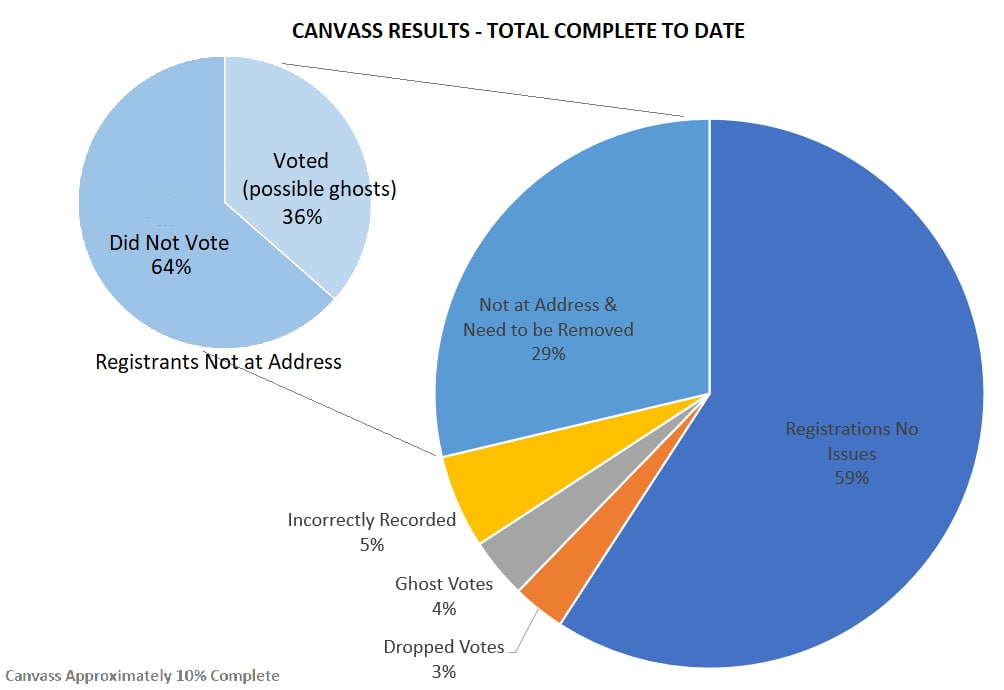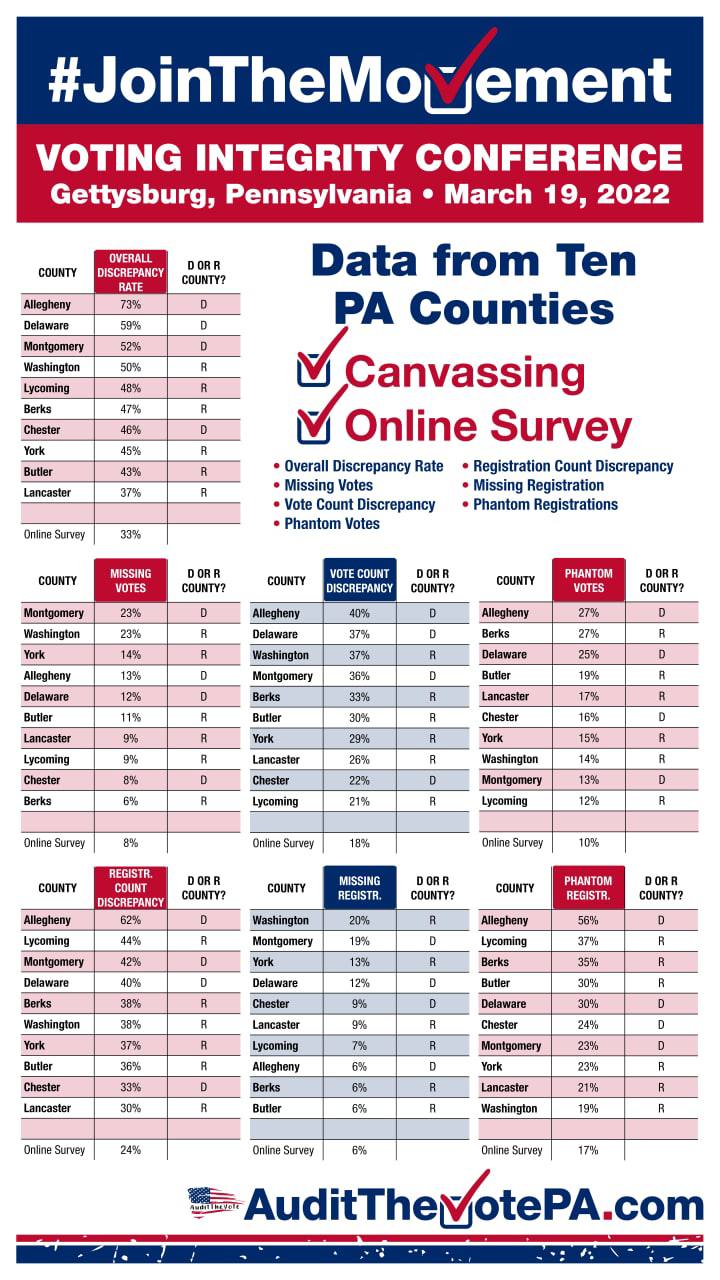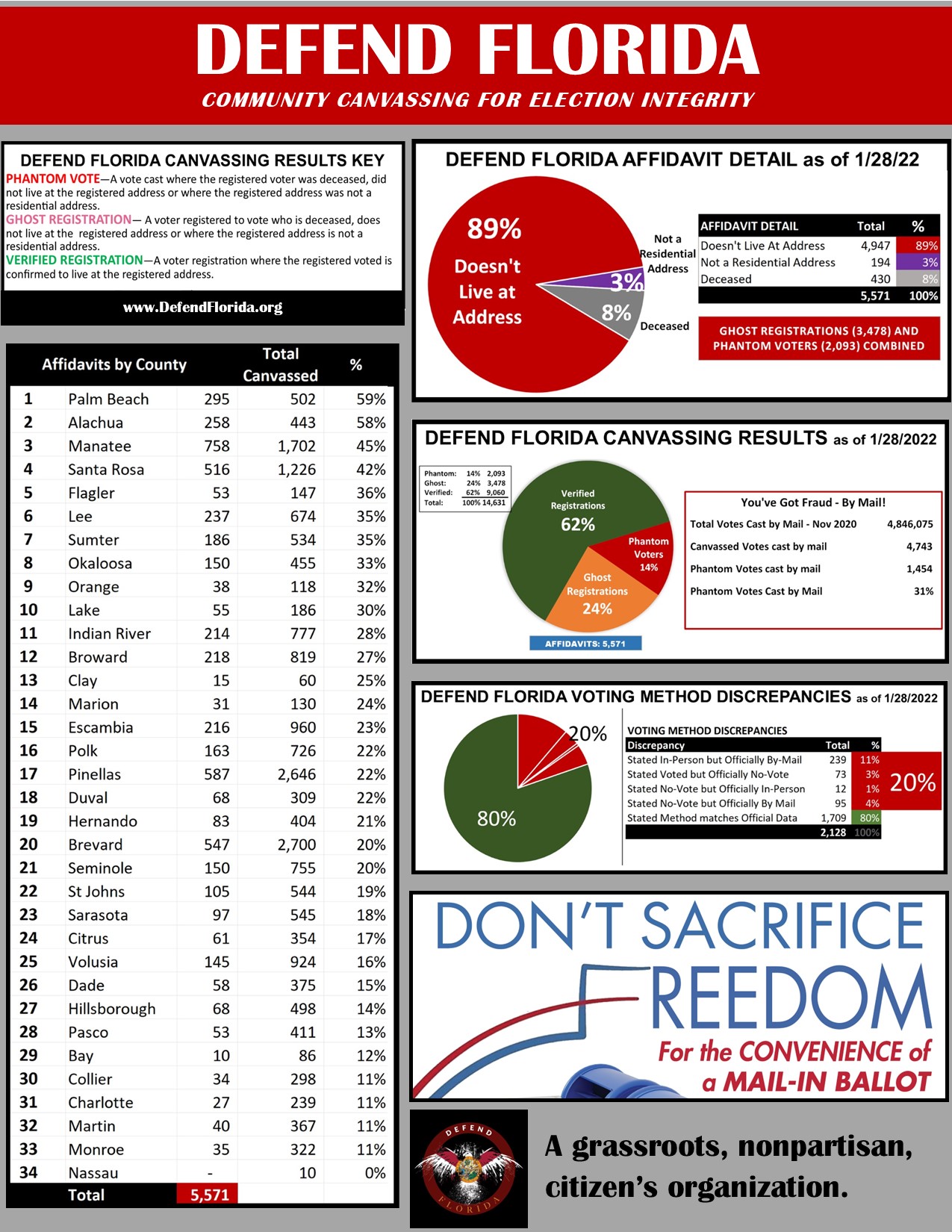Last updated 27 Mar 2022
For an introduction into canvassing and how it works, see Grassroots Canvassing Efforts.
Thanks to the diligent canvassing efforts in the following states, alarming anomalies and irregularities are being uncovered. Here are the states that have reported at least some preliminary results from their canvassing of voters after the 2020 election.
Arizona
The original scope of the Maricopa Forensic Audit included voter canvassing — directly interviewing voters and visiting registered addresses to confirm that official records match how residents actually voted. The Federal Department of Justice swiftly enacted significant pressure against this canvassing, saying that it equated to “voter intimidation”, and would be potentially illegal. This blockade of the Senate’s efforts forced them to focus on the remaining aspects of the audit.
But hundreds of private citizens such as those led by Liz Harris had already begun their own grass-roots canvassing effort, visiting 11,708 residential properties and gathering data on 4,570 voters. On Sep 8, 2021, Harris shared her report revealing that:
-
Votes lost
Out of 964 residents interviewed who were on record as having not voted — over 34% of them said they actually did vote. 1 in 3 of these voters had their votes “lost”. If this rate is applied to the entire county, this would account for 165,518–180,690 lost votes. A similar survey in Nov 2020 found an even higher rate of 50.1% of mail-in ballots not being recorded. 1 -
Votes added
5.66% of the interviews identified “phantom” voters who did not reside at their specified address, yet submitted mail-in ballots. This could affect an estimated 96,389 mail-in ballots out of the 1.7 million total. They discovered repeated instances over 8+ years whereby this occurred.In some cases the ballot was crossed out and returned to the county, at other times the ballot was retained by the real resident; yet in both of these types of cases, ballots were somehow recorded as “returned”, and a vote was counted.
-
Smaller scale issues such as votes cast by mail from vacant lots
The team is also surveying all Arizona residents via a form at canvass50.com, asking as many residents as possible to identify which method they used to vote during the 2020 election, so that any issues with the county records can be identified.
Read our full report on Arizona
Colorado
Sherronna Bishop reports that the canvassing efforts — going door-to-door verifying voters’ information — is indicating that around 5% of ballots in Mesa County may have been cast via faked or “phantom” registered voters. 2 Weld County and Pueblo County are showing potentially even higher rates. They have discovered residents who have stated that they didn’t vote yet official records show that a vote was submitted under their name, similar to what was discovered during Arizona canvassing. Details and written affidavits are being finalized, and we hope to hear further results soon.
Note: We have not confirmed which organization has been running this canvass, but it’s quite likely that it’s USEIP in Colorado.
Read our full report on Colorado
Delaware
On Sep 28, 2021, the non-partisan coalition Patriots for Delaware relayed some alarming findings from their 2020 election canvass: 3
-
A high number of votes coming from some nursing homes who don’t have nearly that many beds:
- 296 votes that came from a nursing home with only 94 beds. That’s 315% votes coming from a facility that is rarely at full occupancy.
- Several other nursing homes reported over 100%, while most facilities in the state reported anywhere from 0% to 75% votes in relation to available beds.
-
Hundreds upon hundreds of votes from “Uniformed and overseas citizens” that used the mailing/residential address of the three county elections offices in the state — a violation of election law
Read our full report on Delaware
Florida
A voter canvass covering Central Florida and portions of both coasts discovered nearly 3,000 addresses listed on voter rolls with serious issues.
They estimate well in excess of a million “phantom votes” (votes made from false addresses) in the 2020 election, which had over 11 million votes cast. Despite the fraud, which by many indications appeared to favor Democrats, Florida still trended 2.3% more Republican in 2020.
Here are some preliminary results from Jan 28, 2022. The table on the left shows the percentages of voters whose record had some kind of anomaly with their address or were deceased.
They have now collected official legal statements (affidavits) from at least 5,571 residents identifying the anomalies.
More results expected soon. Visit DefendFlorida.org for more information and to find out how to get involved.
Read our full report on Florida
Georgia
In November-December 2020, election expert Matthew Braynard was contracted to investigate the election results. From analyzing the voter databases and via phone calls to at least 722 residents (mostly from Fulton County, but also a number of other counties) he reported that:
-
18.39% of registered voters of Georgia who were sent but did not return absentee ballots did not actually request absentee ballots;
-
33.29% of voters who were sent absentee ballots but were not recorded as having returned absentee ballots stated that they did actually mail their ballots back;
-
1.53% of registered voters of Georgia who changed addresses before the election and were recorded as having voted stated that they did not cast a vote;
-
20,312 absentee voters were not residents of the State of Georgia when they voted, and
-
1,043 early and absentee ballots were cast by people who were registered at post office box addresses; and
-
234 Georgians voted in multiple states.
Stephen Ansolabehere later submitted a rebuttal to the claims above in his report, here, indicating that the low number of respondents may not be high enough to extrapolate to the entire state. More canvassing may need to be done.
Read our full report on Georgia
Indiana
On March 21, 2022, Indiana First Action released an hour-long presentation on findings in Indiana, including results from canvassing in Hamilton County, Johnson County, which begin at the 19:00 mark.
They found that 34-46% of addresses surveyed had some kind of election-related anomaly whether it was a voter who didn’t exist at the address, a vote that was not correctly recorded, or some other kind of concerning record-keeping error.
Read our full report on Indiana
Michigan
Macomb County Canvass
Jacky Eubanks, candidate for Michigan State Representative, is leading a grassroots canvassing effort, going door-to-door verifying ballot and voter information from the 2020 election. She started with her hometown of Chesterfield, Michigan, in north-east Detroit, and described her findings as “both alarming and disgusting”. Roughly 18-20% of residences had anomalies or irregularities. Biden’s winning margin in the state was only 2.8%. The types of anomalies include:
- The registered voter does not exist at that address, and has not for 2–25 years
- The registered votes does reside at the address, but states they did not vote, despite a vote being recorded in their name (some even producing their uncast absentee ballot)
- Addresses associated with businesses, which is illegal
- Incomplete addresses, such as specifying a building number but no apartment number
She also found that cities in Macomb County have an unexplained excess of 170,000 more registered voters than people of voting age (and that does not even account for citizenship status or felon status). Again, this number is higher in one single county than Biden’s winning margin of 154,188 votes in the state.
After presenting her findings to the Macomb County Clerk, he seems interested in knowing if these issues are more widespread, so the canvass is looking to expand to other cities.
Jacky Eubanks explained her initial results on OAN:
OAN News, Sep 15, 2021
The Gateway Pundit has published a further interview with Jacky including a 9min video about her preliminary results. She discusses her findings as well as the major resistance she has faced from the state’s Attorney General, state police, FBI, and Republican politicians.
Her results show similar irregularities, yet in even more alarming percentages than the results from the Arizona canvass effort.
Genesee County
Canvassing in Genesee County is underway, targeting precincts that Seth Keshel identified as the most likely ones to have experienced fraud, especially homes with 4 or more registered voters on the Qualified Voter File (QVF).
As of Feb 25, 2022:
-
660 households had been contacted and 297 of these were available for interviewing, accounting for 1023 people on the QVF.
-
335 of those people no longer (or never did) reside in these 297 households. That’s a rate of 32.75% excess registrations in the QVF.
-
52 “people” who were recorded as having voted in November 2020 but did not reside at the address indicated on the QVF, otherwise known as “phantom voters”.
Further canvassing is underway, with more results expected soon.
Note: Because the focus is on the areas most-likely to contain discrepancies, this data cannot realistically be extrapolated across the entire State of Michigan.
Read our full report on Michigan
New Mexico
Volunteer canvassers are surveying county residents to verify whether the election records match with how the voter says how they voted. The canvass is already discovering a large number of incorrect and non-existent addresses and voters:

Source: New Mexico Audit Force, Telegram Post, Mar 5, 2022
Read our full report on New Mexico
Pennsylvania
In the summer of 2021, Audit The Vote PA began working on a canvassing effort in 20 counties across the state to verify the certified results from the 2020 election. This effort was designed to restore voter confidence given all the controversy and unanswered questions surrounding the 2020 election.
The results show that there are egregious discrepancies between the certified result from the State Department and what our canvassers were told from residents at the door.

Preliminary and incomplete results as of Mar 21, 2022. Source: Audit the Vote PA
Lancaster County
As of Feb 1, 2022, 411 doors had been knocked on, with 256 able to be surveyed. 4
- 37% of houses had some election anomaly occur
- 21.17% had phantom registrations (not belonging to the residents) at the address
- 8.56% had less registrations on record than resident stated
- A massive 26.39% of addresses had a different number of votes on record for 2020 than resident stated. 17.13% had phantom votes and 9.3% were missing votes.
York County
As of Feb 1, 2022, 486 houses had been knocked on, with 206 able to be surveyed. 4
- 45% of houses had some election anomaly occur
- 23.4% had phantom registrations (not belonging to the residents) at the address
- 13.1% had less registrations on record than resident stated
- A massive 29.2% of addresses had a different number of votes on record for 2020 than resident stated. 15.3% had phantom votes and 13.8% were missing votes.
Video Summary
Watch on Rumble. By Toni Shuppe, Audit the Vote PA, Feb 1, 2022.
While the results are unable to conclude whether Biden or Trump actually won the election, the number of anomalies is likely far greater than the winning margin, deeming the result inconclusive. This indicates that the election results should not have been certified and may be invalid.
Online Survey
Residents of Pennsylvania can complete the following online form to submit their voting information to help match it against the state databases and identify any anomalies.
Other Counties
Results for other counties in PA are due to be released in the coming weeks. Subscribe to @AuditTheVotePA and stay tuned.
Read our full report on Pennsylvania
South Carolina
On Feb 5, 2022, South Carolina Safe Elections Group released their election canvassing results. The executive summary report is shown below:
The following video (4hrs in total) includes the presentation of the results. We hope to provide a shorter edited version here when it becomes available.
Read our full report on South Carolina
Washington
Using data from the state voter registration database, SVIP volunteers knocked on over 3,000 Skagit County registered voters’ doors, detecting over 1,530 voter anomalies, and collecting over 1,750 written and signed affidavits. Many of these anomalies are potential or real phantom voters (voters who do not exist), including 830 cases where a listed registered voter of the address voted in the November 2020 election, but the voter does not live at the address. 5
Read our full report on Washington
More to Come
If you’re aware of other states that are canvassing, let us know in the comments below.
Footnotes & References
-
Interestingly, Maricopa County stated in their 2020 Voter Education report that 2,160,412 residents requested an early ballot, but only 1,915,487 of them returned their ballot. This equates to 244,925 voters who were recorded as not returning the ballot that they, themselves requested. Is it logical to expect that 11.3% of engaged voters who requested a ballot decided not to return it?
Censored For an overview of the Maricopa Voter Education report, see Dr. Shiva Live: Maricopa Audit Open Forum for Public, Press & Maricopa Election Officials, from 21min 40sec mark. ↩
-
According to Sherronna Bishop, in a video interview with Truth and Liberty: “Interview with Tina Peters and Sherronna Bishop”, Sep 20, 2021. Preliminary canvassing results are mentioned in the video from the 43min 20sec mark. ↩
-
National File: “Massive ‘Fraudulent’ Votes And Apparent Nursing Home Vote Fraud Found in Delaware In 2020 Election”, Sep 30, 2021 ↩
-
Toni L. Shuppe, Audit The Vote PA: Canvassing Results - What Does The Data Mean?, Rumble video, Feb 1, 2022. ↩ ↩2
-
Skagit Voter Integrity Project Summary Report, Sep 30, 2021 ↩
Visitor Comments
Do you know of other canvassing efforts going on around the country? Or know of details we might have missed? Let us know in the comments below.
